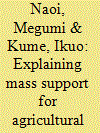| Srl | Item |
| 1 |
ID:
107535


|
|
|
|
|
| Publication |
2011.
|
| Summary/Abstract |
Why are citizens in advanced industrialized countries willing to accept high prices for agricultural products? Conventional wisdom suggests that agricultural interests secure government protection because producers are concentrated and better politically organized than diffused consumers. Due to its focus on producer capacity for collective action, however, the literature fails to account for the high levels of mass support for agricultural protectionism in advanced industrialized nations. This article presents new evidence from a survey experiment in Japan conducted during the recent global recession (December 2008) that accounts for this puzzle. Using randomly assigned visual stimuli, the experiment activates respondents' identification with either producer or consumer interests and proceeds to ask attitudinal questions regarding food imports. The results suggest that consumer priming has no reductive or additive effects on the respondents' support for liberalizing food imports. Surprisingly, producer priming increases respondents' opposition to food import, particularly among those who fear future job insecurity. We further disentangle the puzzling finding that consumers think like producers on the issue of food import along two mechanisms: "sympathy" for farmers and "projection" of their own job insecurity. The results lend strong support to the projection hypothesis.
|
|
|
|
|
|
|
|
|
|
|
|
|
|
|
|
| 2 |
ID:
106254


|
|
|
|
|
| Publication |
2011.
|
| Summary/Abstract |
In an article printed last year in International Organization, Keohane, Macedo, and Moravcsik argued that multilateral organizations (MLO) could actually be good for democracy. We argue that KMM discount the prospect that MLO influence can be detrimental to democracies not because MLOs are "distant, elitist, and technocratic" but precisely because MLOs are highly political. International organizations have much to offer in improving the welfare of citizens and facilitating coordinations among states. They are not likely to improve procedural functions of democracies without a cost that itself is problematic for democracy.
|
|
|
|
|
|
|
|
|
|
|
|
|
|
|
|
| 3 |
ID:
089041


|
|
|
|
|
| Publication |
2009.
|
| Summary/Abstract |
This article investigates the conditions under which states use General Agreements on Tariff and Trade (GATT)/World Trade Organization (WTO) legal measures rather than bilateral or unilateral instruments to protect domestic industries. Contrary to the conventional wisdom that international trade has become increasingly legalized and multilateralized, we demonstrate that domestic electoral politics loom large in a state's decision to resort to international law. Legislators' need to mobilize votes and campaign donations and the electoral systems had substantial effects on the government's choice to use GATT/WTO compliant protection among a wide array of protectionist instruments. The article tests this argument using new commodity-level data on trade instrument choice (subsidy, voluntary export restraints [VERs], and GATT/WTO legal measures) from the second largest economy that has experienced major electoral reform, Japan. The results lend strong support to our argument. Higher electoral competition is associated with the likelihood of using VERs and the electoral reform of 1994 was a force behind the sudden surge of legislators' interests in using WTO legal safeguard measure. The article finds, moreover, legislators strategically deviate from the new WTO rules, such as prohibition of VERs, when it is electorally beneficial to do so.
|
|
|
|
|
|
|
|
|
|
|
|
|
|
|
|